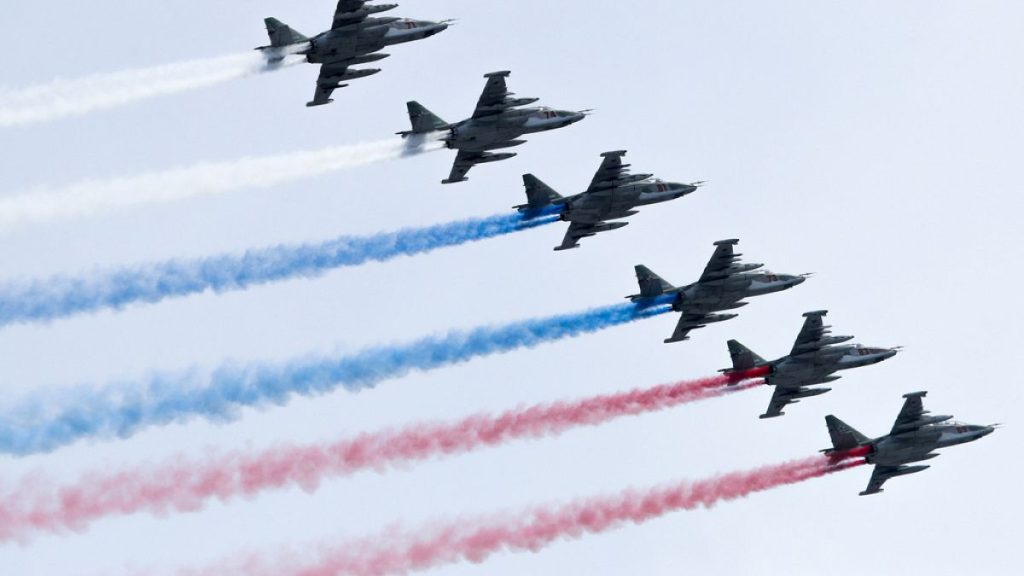Hundreds of Russians gathered in Vienna to celebrate the victory over Nazi Germany in World War II. Ukraine had made efforts to have the anniversary celebrations banned, but these attempts were unsuccessful. Some of the participants were openly critical of Europe and Ukraine, leading to tensions in the Austrian capital. The Ukrainian embassy expressed concerns that the celebrations were anti-democratic and disrespectful to Ukrainians currently affected by the conflict with Russia. A Ukrainian protest took place alongside the anniversary event, with participants emphasizing the need to mourn the war’s victims rather than celebrate what they viewed as propaganda from Russian President Vladimir Putin.
Despite Ukraine’s concerns and protests, the anniversary celebrations in Vienna went ahead as planned, with Russian participants marching through the streets to commemorate the victory over Nazi Germany. The Ukrainian embassy lamented the inability to prevent the event from taking place, arguing that it was inappropriate given the ongoing conflict between Ukraine and Russia. Ukrainian residents in Vienna echoed these sentiments, expressing their disapproval of the celebrations and accusing Putin of using the occasion to promote his own political agenda. The clash of perspectives between participants in the anniversary event and Ukrainian protesters highlighted the deep-seated tensions between Russia and Ukraine, as well as the polarizing effects of commemorations related to World War II on the European stage.
The Ukrainian protest in Vienna served as a reminder of the ongoing conflict between Ukraine and Russia, as well as the divergent interpretations of World War II and its legacy in the region. While the Russian participants viewed the anniversary celebrations as a moment of pride and remembrance, Ukrainian protesters saw them as a means of glorifying the Russian government and disregarding the suffering of Ukrainians impacted by the conflict. The presence of both groups in Vienna underscored the complexities of commemorating historical events, especially those with political overtones, and the challenges of reconciling conflicting narratives in a globalized world. The clash between the two perspectives highlighted the deep-seated divisions within Europe and the difficulty of finding common ground on sensitive issues such as war and national identity.
The inability of Ukrainian authorities to prevent the anniversary celebrations in Vienna raised questions about the limits of freedom of expression and the challenges of balancing historical memory with political sensitivity. While Ukraine sought to ban the events due to their perceived anti-democratic and inflammatory nature, Austrian authorities allowed them to proceed, citing the principles of free speech and assembly. The conflicting positions of the Ukrainian embassy, Russian participants, and Austrian officials illustrated the complexities of managing public commemorations in a diverse and divided society, where differing viewpoints on historical events can lead to tensions and conflicts. The events in Vienna highlighted the need for open dialogue and mutual understanding on sensitive issues such as war and national identity, as well as the importance of respecting divergent perspectives while seeking common ground for reconciliation and peace.
The divergent reactions to the anniversary celebrations in Vienna reflected broader tensions between Russia, Ukraine, and European countries regarding the interpretation of World War II and its implications for contemporary politics. While Russian participants viewed the event as a moment of pride and remembrance, Ukrainian protesters and officials saw it as a means of promoting Russian propaganda and disregarding the suffering of Ukrainians impacted by the conflict. The clash of perspectives highlighted the ongoing conflicts and divisions within Europe, as well as the challenges of reconciling divergent narratives on sensitive historical issues. The events in Vienna underscored the need for open dialogue, mutual respect, and understanding among nations with differing perspectives on war, memory, and national identity, in order to foster reconciliation and peace in a complex and interconnected world.


